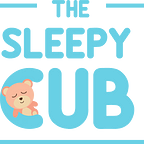Sleep Training A Teething Baby: 3 Proven Tips
Sleep training a teething baby can be quite challenging. Here are three proven tips that will make the process much easier.
The list of things that can disrupt your child’s sleep is quite long. Sleep regressions, growth spurts, and negative sleep associations, they’re all every parent’s nightmare.
Teething is nothing less challenging. In fact, a teething baby can be a nightmare. There’s nothing fun about dealing with irritability, disrupted sleep, swelling of the gums, mild temperature, and diarrhea.
Even worse, the teething has appeared just when you were starting to make good sleep training progress.
What do you do now? Should you call it off? Or should you keep going?
In this post, I’ll explain everything you need to know about sleep training a teething baby and offer three tips to help manage your baby’s teething discomfort.
Let’s dive in!
Can I sleep train my baby while he’s teething?
Parents’ main question is whether they should continue sleep training their baby while he’s teething. My recommendation is yes.
Keep in mind that this is a general recommendation. There are some cases where the baby can have a severe case of teething and the parent is forced to suspend their efforts for a night or two.
But in general, there’s no reason to stop sleep training because of teething. If you’re waiting for the perfect moment to sleep train, you may never get around to teaching your baby how to self-soothe.
Remember: there will always be some issues that appear out of the blue, whether that is sleep regression or a developmental milestone. The sooner you instill healthy sleep hygiene, the better.
Although you might need to alter your sleep training plan a bit during the first few days, it’s generally best if you stick with sleep training.
Why should you teach a teething baby to sleep through the night?
Sleep training is the best way to help your baby sleep through the night, take restful day naps, and be healthy.
Think about this for a moment: would you prefer your child to be able to put himself to sleep without you or wake you multiple times a night due to sore gums?
I think it’s the former.
In my years as a sleep consultant, I’ve worked with many parents and children. I can safely say that children who are sleep trained handle teething and other illnesses much better.
How to handle teething and sleep training
Don’t interrupt your baby’s sleep training progress because of teething. Instead, try doing some of the tips outlined below:
Try teethers
Teethers, or teething toys, are a great way to alleviate your child’s pain without using any medicines.
Teething toys offer your baby who’s dealing with sore gums something soft to chew on. In fact, the gumming action provides counter pressure for your baby’s soon-to-come-out teeth, which can help alleviate pain.
The good news is that teething toys come in different styles and materials, so choosing the best one for your baby’s gums shouldn’t be challenging.
The Nuby Teether, Baby Banana Teething Toothbrush, and the Zo-Li Gummy Stick are all top picks.
Apart from teethers, you can always go with a homemade option like a cold washcloth — it works wonders, too.
Give him a pain reliever
As useful as teethers are, they have one downside: they don’t work while your child is sleeping.
For that, you’ll need a pain reliever.
If the pain is severe and prevents your child from getting a good night’s sleep, consider offering him a pain reliever like Tylenol or Ibuprofen to alleviate the pain.
However, make sure you consult with your pediatrician before offering medication just to be sure it’s safe for your baby.
But when should you give your little one pain reliever? The best time would be after the bedtime feeding. The medication will last for about 4–6 hours, so that should help you get a shit-eye, too.
Just make sure you avoid pain relievers that contain benzocaine or lidocaine. These substances can be harmful — even life-threatening — to your baby.
Provide comfort without undoing progress
My final tip on the list for sleep training a teething baby is to provide comfort without undoing your progress.
What does this mean?
Let’s say that your baby is inconsolable and has been crying for an eternity. You have to find ways to offer comfort without creating new negative sleep associations. Instead of picking him up and co-sleeping, try holding him until he’s calm and putting him down awake to fall asleep on his own.
If your child is dealing with severe pain, you may need to break your progress for a night or two, but make sure you don’t do it long-term. One night of co-sleeping with your little one won’t do much damage, but ten days might.
Final word
To sum up:
- There’s no reason to stop sleep training because of teething. If you’re waiting for the perfect moment to sleep train, you may never get around to teaching your baby how to self-soothe.
- Sleep training is the best way to help your baby sleep through the night, take restful day naps, and be healthy.
- Children who are sleep trained handle teething and other illnesses much better.
- The three best strategies for sleep training a teething baby include teethers, pain relievers, and providing comfort without undoing progress.
Sleep training a teething baby can get challenging for some parents, and you may need help from an expert to get it done right. An experienced sleep trainer can make the process easier for both the parent and the child. Connect with us today and get a personalized plan for your baby. I’ll be there to guide you every step of the way.
Originally published at https://thesleepycub.us on July 16, 2021.
